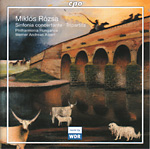Miklós Rózsa’s 1958 Sinfonia concertante shares with his film music a certain epic sweep, with solo violin and cello acting as protagonists in some grand drama. Throughout there are hints of Rózsa’s famous score for Ben-Hur (particularly in the first and last movements), which he was composing at the time. But this is concert music nonetheless, with highly imaginative solo writing that’s masterfully performed by András Agoston and Lásló Fenjo alongside Werner Andreas Albert’s powerfully rendered accompaniment.
At the other extreme, the inward, meditative Notturno Ungherese highlights another aspect of Rózsa’s musical personality with its alluring evocations of Hungarian folk music realized in (as usual) vivid orchestral coloring. The folk element figures even more strongly in the composer’s 1972 quasi-symphonic Tripartita. After an arresting 5/4 first movement, the piece emulates Rózsa’s compatriots Kodály and (especially) Bártok, whose Miraculous Mandarin occasionally comes to mind. However, just as when Bernstein “channeled” Copland, there’s enough of Rózsa’s own voice present to make this a uniquely enjoyable work–especially so thanks to Albert’s convincing advocacy and the Philharmonia Hungarica’s powerfully idiomatic playing. CPO’s spacious recording is rather distant, giving the impression of an empty hall.
































